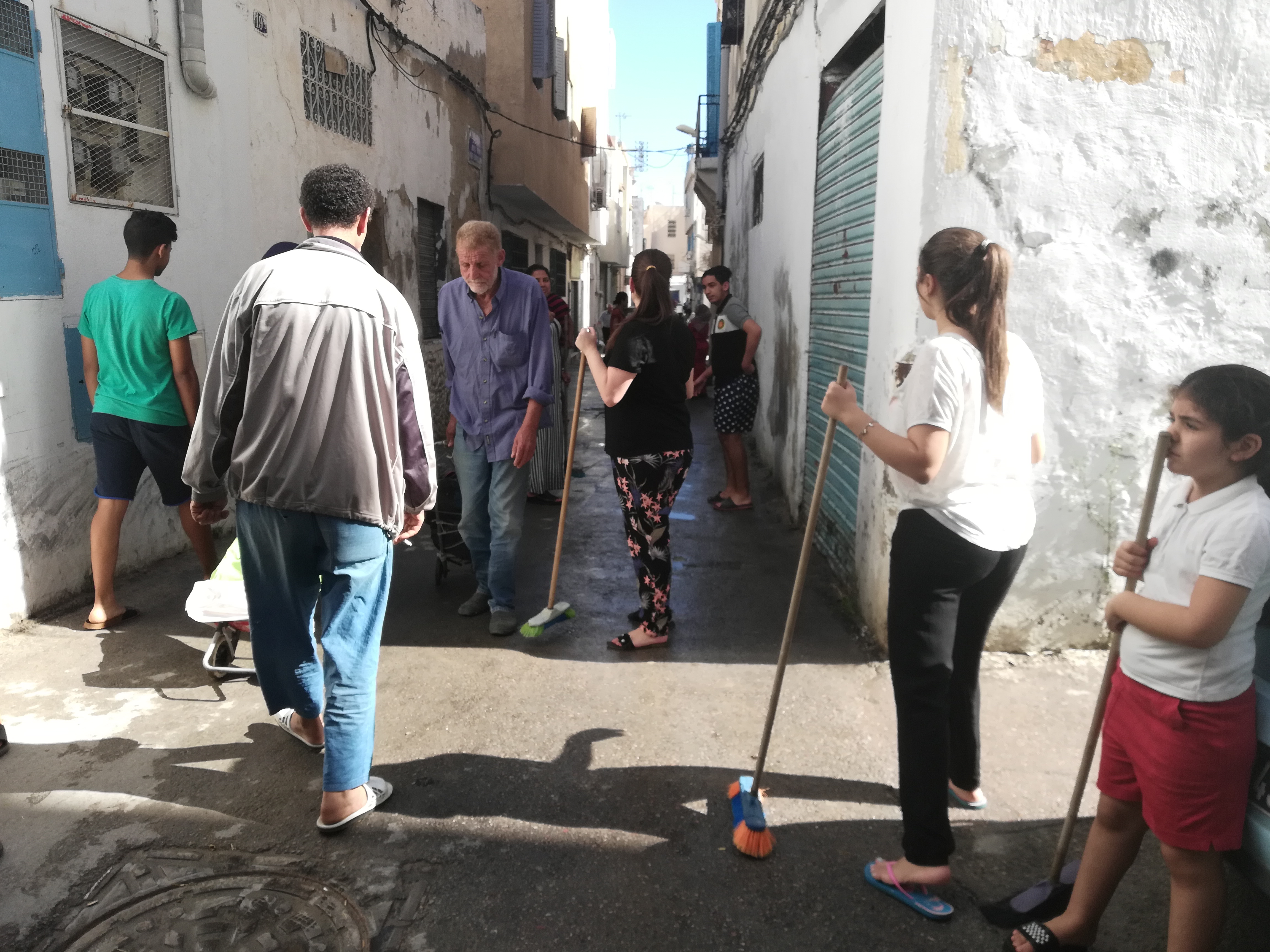Kaïs Saïed won more than 70% of the national vote in the 2019 presidential election. It was a landslide victory that brought with it an unprecedented wave of new community-led projects through vast swathes of the country. On the evening of Saïed’s victory, several citizen-led initiatives were launched online, inspired by the new president who was elected without ties to any party or potential parliamentary coalition.
One of these initiatives involved cleaning up local neighborhoods and has since been carried out by many residents. Some were critical of this initiative, claiming that the project was useless and exploitative. However, the initiative was mostly well received. On launch day, thousands of photos of newly cleaned roads and street art were posted on social media, testifying to the enthusiasm for the campaign. But more than that, some residents claim there is a binding link between their new initiative and Kaïs Saïed's agenda: a form of collective awareness and a shared desire to reappropriate public spaces.
"We have the solutions to our problems."
"This campaign is the first step towards the realisation of Kaïs Saïed's political project. We want to show that every neighborhood in Tunisia can organise itself independently and in coordination with other neighborhoods. We have the solutions to our own problems! All we need is executive power," explains Youssef Ben Younes, 22, an entrepreneur.
The young man affirms that "the objective of this revolution is to decentralize power [...] to give decisions back to the people." He no longer wants a "municipal council made up of elected officials who do not represent him" and approves of Kaïs Saïed's proposals.
During the presidential campaign, Saïed declared his willingness to change the electoral law by eliminating the list system, which he believed overly favored the main political parties. In its place, he has proposed a political and electoral system that would give more power to local communities and allow for better representation at the national level. Citizens would also have the possibility of challenging their elected representatives.
Youssef says that after the launch of the clean-up campaign on social media, neighbors directly appointed a man named "Mehdi" to supervise the project and to be responsible for collecting money from local residents. "The choice of Mehdi was obvious as he is the person who has made the greatest contribution in keeping the neighborhood clean. What we're asking is simple: we want to vote for people in our local community to take over the collective decision-making."
What we must remember from this campaign is that this is "the reappropriation of public space," says Chaima Bouhlel, an activist and specialist in decentralization and local governance.
"Nowadays residents don’t consider the street to be the property of the state. It’s also theirs."
She noted that these clean-up campaigns do not have the capacity to replace the state’s role in waste management. "But they do change our benchmark and illustrate our demand for cleanliness. This initiative is not going to push the state to transfer more responsibility onto local residents, on the contrary, it will raise residents' expectations and therefore force the state to become more involved in meeting their new standards," she says.
The Ministry of Local Affairs and the Environment issued a press release to this effect on October 16, 2019, calling on municipalities to support this clean-up initiative by logistical means.
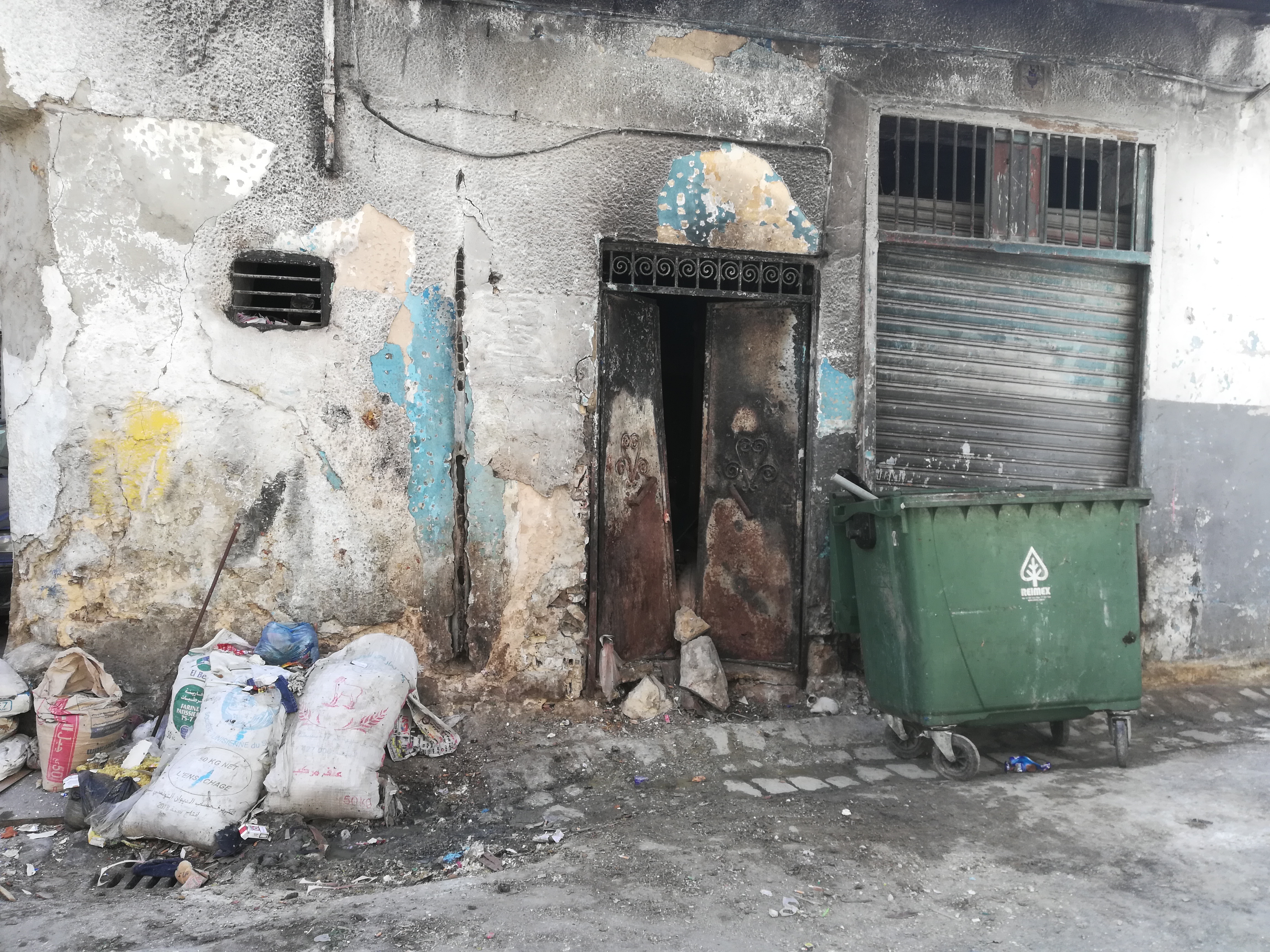
In Bab Dzira, many streets are filled with rubbish and several buildings are left abandoned. Credit: Henda Chennaoui
The Kaïs Saïed Effect?
"I've been cleaning this part of my neighborhood regularly for 10 years. For me, it's a question of moral conscience and civic duty," says Mehdi Abdelhedi, 28, a student and leader of the working group. With regard to Kaïs Saïed's election, Mehdi believes that ‘‘it is important that the government provide residents with the freedom to propose solutions for their neighborhoods." "We want to be active," he insists.
Not far from Mehdi and Youssef, three young girls sweep the street with enthusiasm. "[Kaïs Saïed] is the only one who addressed young people directly with positive messages. He has given us back our confidence and now I think it's up to us to change the country," exclaims Syrine, 25, a Master's student.
In the district of El Hafsia, divided between shops and homes, the emblematic Ahmed Bayrem Street is suffering from years of neglect. For a long time, the municipality's only contribution to the upkeep of this neighborhood has been collecting trash from a few garbage cans, say local residents. "The whole system needs to be changed, but we can make a start by keeping our neighborhood clean. First decision: the garbage should only be taken out between 8 and 10 in the evening. Second decision: fix rubbish bins every 500 meters. Third decision: color the streets, clean them regularly and never again allow the state to be uniquely responsible," says Hatem Guizani, 57.
This man was born and raised in the El Hafsia district of Tunis. The day after the launch of the social networking campaign, Hatem invited his neighbors to take part in the clean-up campaign. He initiated the money collection, contacted the municipality, and created a Facebook group about the logistics of the operation. All-day Sunday, the residents were in discussion and organizing themselves. They assure us that this is only the beginning.
Despite holding the new president in high esteem, Hatem believes that "this campaign has nothing to do with Kaïs Saïed." "What's significant is that Saïed hasn't promised anything. His program is to empower residents and give them free rein in coming up with new ideas and projects," he says.
"Kaïs Saïed has managed to give new hope to Tunisians. He has explained to them that they are capable of charting their own futures, and that he will be the guarantor to their aspirations," says Mounir Saidani, a sociologist and university professor.
According to Saidani’s analysis of recent popular sentiment, "Tunisians are going through a process of recovery regarding their self-confidence and how they perceive their futures. It must be remembered that over the last eight years, the aspiration for change, especially that of the young, has been betrayed."
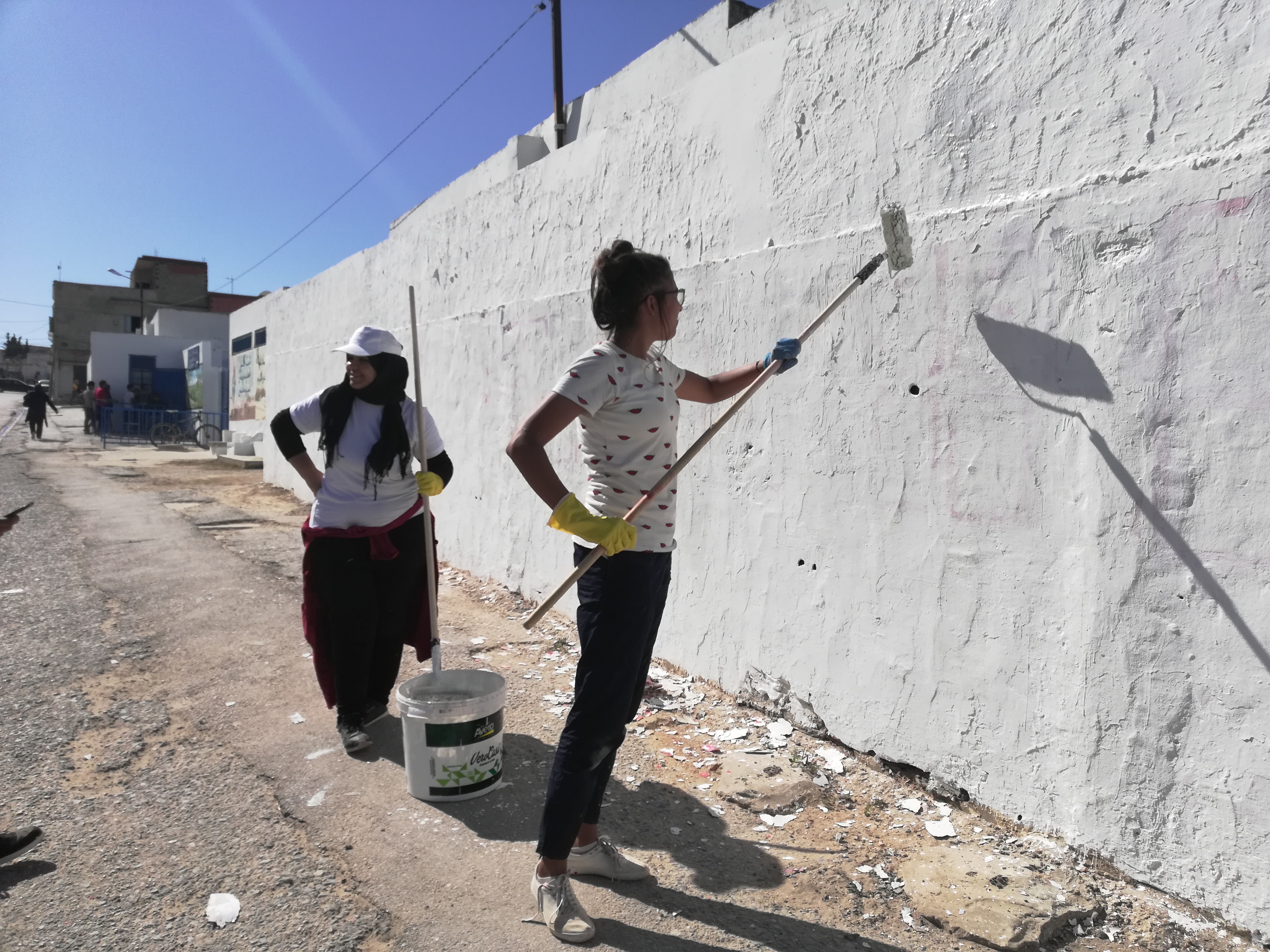
In Sidi Hassine, a young girl is repainting the wall of a primary school. Credit: Henda Chennaoui
A Political revenge
About ten kilometres from Bab Dzira, Sidi Hassine, one of the poorest and most marginalized neighborhoods in the capital's outlying belt, is experiencing the same craze. At every street corner, residents and activists from different associations are working hard to repair years of neglect.
"I was 17 at the time of the revolution. And I can assure you that my memories are limited to the clashes with the police and their retaliation. Since then, nothing has happened. Some young people have gone to Syria, several others have boarded boats to go to Europe. What about us? Nothing at all. The old men have taught us nothing. Not to clean, not to think, not to claim our existence," exclaims Marouen Yahyaoui, 25, a salesman in a private factory.
For Mounir Saidani, young people especially have developed "a feeling of disappointment, coupled with fears and a loss of bearings." "The context of the political crisis and the disregard of the entire official political - both those governing and in opposition - of the social demands during the post-revolutionary years have aggravated these feelings," he says.
But today, Marouen is optimistic. "When Kaïs Saïed promised to let young people draw up a program for Tunisia, these formerly opposing factions became untied. We are no longer ashamed to take the initiative and teach our children to love their country, and this naturally involves safeguarding and maintaining local neighborhoods and schools," he says.
‘‘This sense of self-confidence and drive towards reappropriation could constitute a form of compensation for the despair and usurpation of the revolution caused by figures, still active, from the old regime."
To the side of the group of workers, a woman calls out to the young people who are arguing about what to do next. She suggests that they eat a meal she has prepared especially for them. "Not Nabil Karoui's makarouna [pasta]! This one is clean," jokes one of the men in the middle of the resting groups.
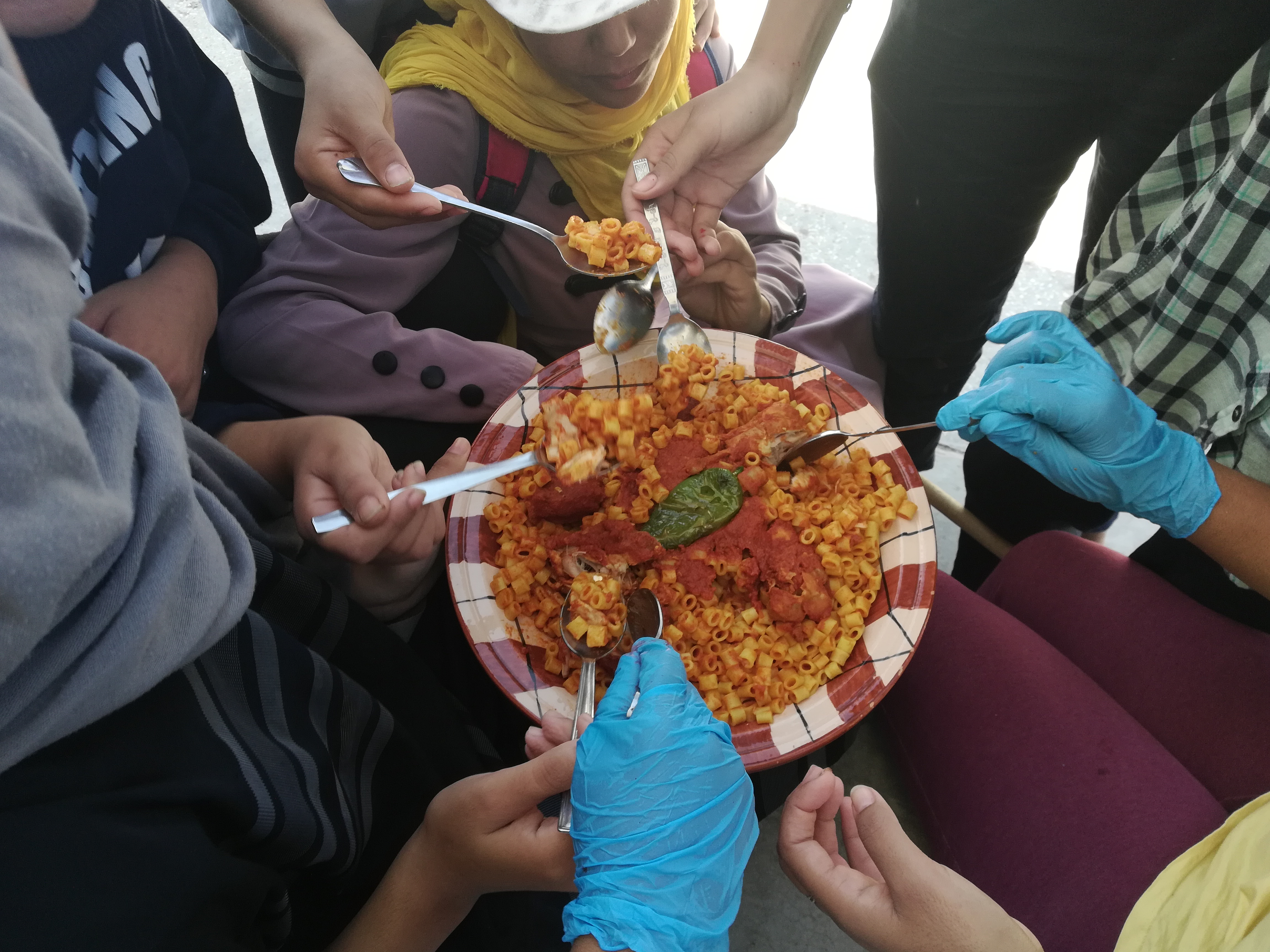
The inhabitants of Sidi Hassine take a break, time for a quick lunch. Credit: Henda Chennaoui
Further ahead, a truck from the municipality stops in front of another group of workers to give them some equipment, but the content is limited. Young women take pictures of three brooms and two buckets of paint. "It's all they could give us," one of them laments.
In front of a school, Abdessatar Mansour, a 22-year-old artist, and several members of his underground art collective are making a tag. "I'm not optimistic about Kaïs Saïed. I know that this enthusiasm will eventually disappear, especially when the next Parliament forms. But we're still happy to have money collected by the inhabitants to buy spray canisters for our graffiti," he says.
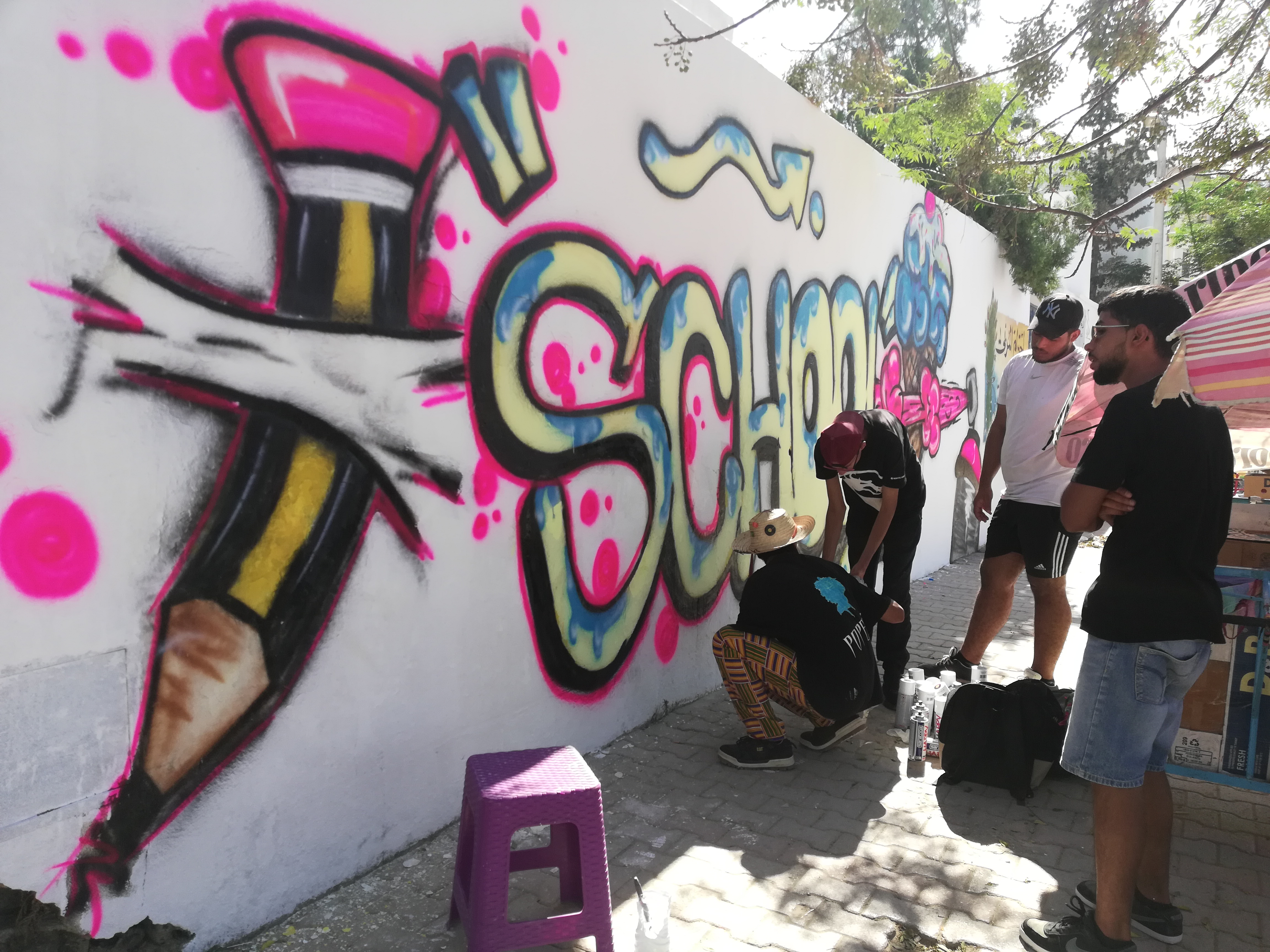
The collective to which Abdessatar belongs is painting graffiti on the wall of a school in Sidi Hassine. Credit: Henda Chennaoui
Abdessatar and his group decided to tour the schools of Sidi Hassine and decorate the walls with graffiti. After repainting the school attached to the market, they leave for the school in the March 20 district, where the inhabitants have already finished collecting rubbish. The walls are repainted white and the sidewalks are cleared.
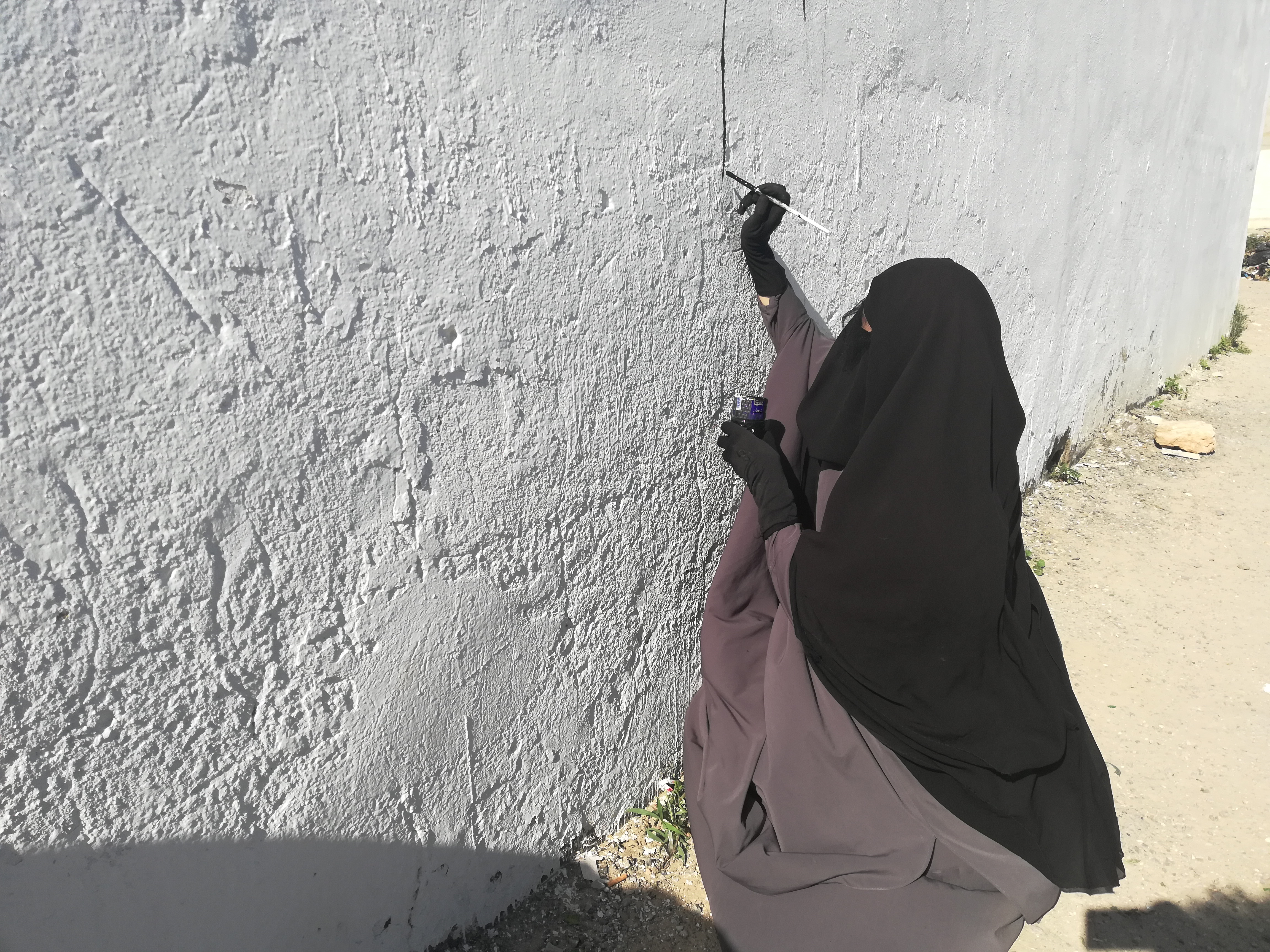
A resident of Sidi Hassine begins a drawing on the school wall. Credit: Henda Chennaoui
Right next to the group of graffiti artists drawing the face of a woman covering her mouth with a scarf, a group of young women draw a man transforming into a bird.
The leader of the group is an unemployed young woman who has been wearing the niqab for nine years. "I'm banned from working and I can't go to the hospital or to an administrative building because of my niqab," regrets the young woman, who seems happy to be able to exercise her passion for painting. "As a child, I always wanted to be a painter. Now it seems to me that it will be possible to make our dreams come true. Let's hope it lasts, even for a little while," she concludes.
